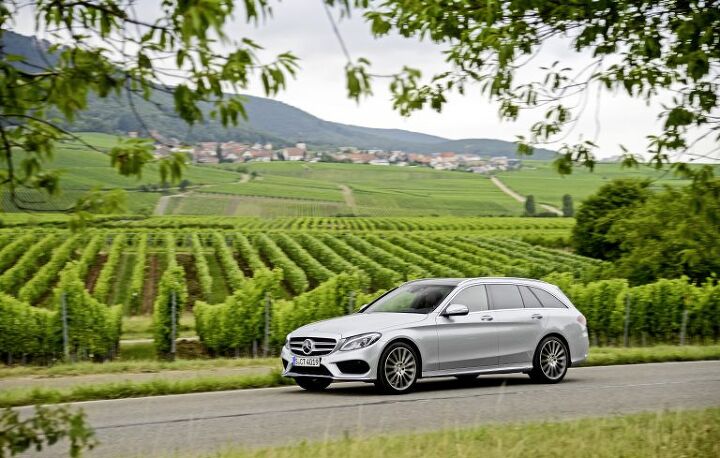#Mercedes-benzC-classWagon
The Mercedes-Benz C-Class Wagon Liveth! (In Q3, In Canada, Without A Diesel)
News that the 2017 Mercedes-Benz C-Class Wagon would arrive in North America with a diesel powerplant and all-wheel drive caught many industry observers by pleasant surprise early last year.
But it’s been 15 months since Mercedes-Benz announced at 2016’s Montreal Auto Show that the C300d 4Matic would be sold in Canada, albeit not the United States.
Not a crossover, not tall, not be-cladded, not even remotely intended for mass consumption, the C-Class Wagon was destined to be a cult favourite — that’s right, favourite — in The Great White North. However, eight months after the announcement, there was still no C300d 4Matic wagon in Mercedes-Benz’s Canadian showrooms. Blame Volkswagen’s diesel emissions scandal for delaying the certification.
Yet TTAC was told just yesterday the C-Class Wagon will appear in Canadian showrooms later this summer with a, how do you say in the Canadianese… minor change, eh?
Mercedes-Benz Canada Has No Timeline For C-Class Wagon Arrival
Mercedes-Benz Canada’s surprise reveal of a diesel-powered C-Class Wagon at January’s Montreal International Auto Show has not been followed by the car’s arrival in Mercedes-Benz showrooms. Nor is it about to be.
Only yesterday we listed the C-Class Wagon, intended to go on sale in Canada as the C300d 4Matic, as one of eight cars Canadians have access to that Americans don’t. Recognizing that the 2017 C-Class Wagon wasn’t yet featured on the company’s Canadian website, our curiosity was further piqued by TTAC reader bortlicenseplate, who suggested that, “the C-Class Wagon is no longer Canada-bound.”
bortlicenseplate is mostly right. Mercedes-Benz Canada still intends to import the C300d 4Matic Wagon, but Mercedes-Benz Canada spokesperson JoAnne Caza told TTAC yesterday, “We’re still waiting for certification.”
8 Cars Canadians Can Buy That Americans Can't
The Canadian new vehicle market is not merely a mini-representation of the U.S. auto industry. Full-size pickup trucks own a significantly larger percentage of the Canadian market, for example, and Canadians are nearly three times more likely to buy a Toyota Corolla than a Toyota Camry.
The Canadian market can, however, be a useful test bed.
Some new vehicle pass the test, such as the BMW X1 which enjoyed 16 fruitful months in Canada before grabbing a slice of the American pie. Others, such as the Chevrolet Orlando, wilt under the pressure of the Ontario-built Dodge Grand Caravan, endure a brief four-year run, and never even get a chance to make it in America.
Other cars aren’t prone on a test bed, they’re simply the response of different automakers to different markets. We already looked at seven U.S.-market vehicles which don’t make their way through the Detroit Windsor Tunnel. These are the eight current vehicles which are marketed in Canada, not the United States. ( We’ve already examined the seven cars Americans can buy that Canadians can’t.)


















Recent Comments